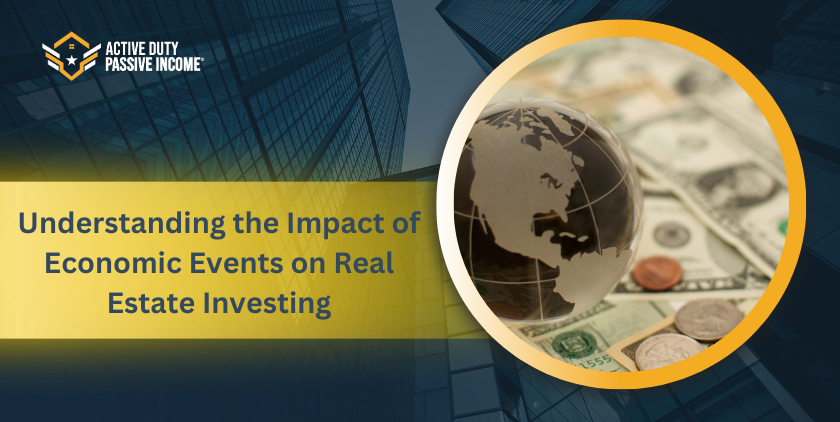Ready to dive into real estate investing but still feeling uneasy or have questions about how the economy affects the real estate world? Stay tuned to learn more!
Real estate investment has long been considered one of the most stable and lucrative forms of investment. However, the stability and profitability of real estate investments are not immune to the ebbs and flows of the economy. Economic events, ranging from recessions to interest rate changes, can significantly impact the real estate market, shaping investment opportunities and risks. Understanding these impacts is essential for real estate investors to make informed decisions and navigate through turbulent times effectively.
The Interconnectedness of Economics and Real Estate
Real estate markets do not exist in isolation but are deeply interconnected with the broader economy. Economic indicators such as GDP growth, employment rates, inflation, and consumer confidence exert profound influence on real estate dynamics. For instance, during periods of economic expansion, rising incomes and consumer confidence often drive demand for housing, leading to increasing property values and rental rates. Conversely, economic downturns can lead to decreased demand, falling prices, and rising vacancies.
Interest Rates and Monetary Policy
Interest rates set by central banks play a pivotal role in shaping the real estate market. Changes in interest rates directly affect mortgage rates, which in turn impact property affordability and investment returns. When interest rates are low, borrowing costs decrease, stimulating demand for real estate investment and driving property prices higher. Conversely, higher interest rates increase borrowing costs, reducing affordability and potentially dampening property demand and prices.
Moreover, central banks’ monetary policies, such as quantitative easing or tightening, can influence liquidity in financial markets, impacting investors’ access to capital and overall market sentiment. Understanding the nuances of monetary policy and its potential impacts on real estate financing is crucial for investors to adapt their strategies accordingly.
Economic Cycles and Real Estate Performance
Real estate markets are cyclical, often following broader economic cycles of expansion, peak, contraction, and trough. Each phase of the economic cycle presents distinct opportunities and challenges for real estate investors.
During periods of economic expansion, robust job growth, rising incomes, and low-interest rates typically fuel demand for commercial and residential properties. Investors may capitalize on this momentum by acquiring properties, renovating or developing new projects, and enjoying appreciation in asset values.
Conversely, economic downturns can pose significant challenges for real estate investors. High unemployment, decreased consumer spending, and tightened credit markets can lead to declining property values, increased vacancies, and financial distress. However, downturns also present opportunities for savvy investors to acquire distressed assets at discounted prices, capitalize on market inefficiencies, and position themselves for future growth.
Supply and Demand Dynamics
The fundamental principles of supply and demand strongly influence real estate markets. Understanding local market dynamics, including population growth, demographic trends, and supply constraints, is essential for assessing investment opportunities and risks.
In regions experiencing rapid population growth or limited housing supply, demand for real estate may outpace supply, leading to escalating prices and rental rates. Conversely, oversupplied markets or areas with declining populations may experience downward pressure on prices and rents, posing challenges for investors.
Furthermore, shifts in consumer preferences and lifestyle trends, such as remote work preferences, urbanization, or suburbanization, can alter demand patterns and impact property values. Adapting to these changing dynamics and identifying emerging trends is critical for successful real estate investing.
Geopolitical Factors and Market Sentiment
Geopolitical events and global economic trends can also influence real estate markets and investor sentiment. Factors such as trade tensions, geopolitical conflicts, regulatory changes, and currency fluctuations can introduce uncertainty and volatility into financial markets, affecting investor confidence and risk appetite.
For instance, geopolitical instability or policy uncertainty may lead investors to seek safe-haven assets such as real estate, driving up demand and prices in stable markets. Conversely, geopolitical crises or economic downturns in key trading partners can have spillover effects on domestic real estate markets, affecting demand from international investors and multinational corporations.
Risk Management Strategies
Given the inherent volatility and unpredictability of economic events, prudent risk management is essential for real estate investors. Diversification across different asset classes, geographic regions, and property types can help mitigate risks associated with economic downturns or localized market disruptions.
Moreover, maintaining adequate liquidity and financial reserves is crucial for weathering periods of market turbulence and capitalizing on investment opportunities as they arise. Investors should also conduct thorough due diligence, including market research, financial analysis, and risk assessment, to identify and evaluate potential investment risks effectively.
Adaptive Strategies for Changing Conditions
Successful real estate investors must be adaptable and responsive to changing economic conditions and market dynamics. Flexibility in investment strategies, such as adjusting property acquisition criteria, optimizing financing structures, or exploring alternative asset classes, can help investors navigate through challenging environments and capitalize on emerging opportunities.
Furthermore, maintaining a long-term perspective and focusing on underlying fundamentals, such as cash flow generation and asset quality, can help investors withstand short-term market fluctuations and achieve sustainable returns over time.
Understanding the impact of economic events on real estate investing is essential for investors to navigate through volatile markets and capitalize on investment opportunities effectively. By analyzing the interconnectedness of economics and real estate, monitoring key indicators and market trends, and implementing prudent risk management strategies, investors can position themselves for success in any economic environment. Ultimately, a well-informed and adaptive approach to real estate investing can help investors achieve their financial goals and build wealth over the long term.
If you’re ready to start your real estate investing journey, click the box below to schedule a free freedom call at your own convenience to go over next steps!








